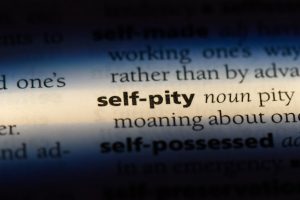Podcast: Play in new window | Download
Subscribe: RSS
Today we talk about victimhood with our returning expert David Wetmore, a life coach with years of

experience. David has been a previous guest sharing his knowledge and experience with regards to Life Coaching and Stress Management.
David starts by explaining the difference between being victimized and victimhood. One can be victimized once (the act, e.g., breaking a leg) while one can practice victimhood as many times as they like and stay in that state. The key is for the individual to decide if they are in charge of their life or the circumstances and events they experience are. David’s comments from the second podcast on stress management are reviewed – does one have an inside-out or outside-in approach to life.
Even detrimental experiences can be opportunities to grow. An example was given of a surgery patient proactively exploring what they could do before/after surgery in order to “own” the surgery and move forward with their life.
The discussion turns to the consequences of someone taking on the victimhood role:
- a sense of neediness sets in and there is a demanding the outside world take responsibility for improving the spirits of the victim. “Needy is creepy!”, in both senses of the word – expanding and irritating.
- the victim has to make the decision to take the inside-out approach and take responsibility for themselves. No one can do that for them, no matter how smart the helping person is.
- a blindness sets in where the victim doesn’t see the consequences of their holding on to victimhood.
- If the feelings persist the sense of victimhood and lowering of self-esteem go hand-in-hand and intensify.
- the victim can become aggressive feeling that no one is understanding and taking care of them.
Viktor Frankl and his concept of catharsis was discussed, how people try to exorcise themselves by projecting out into the world their inward, destructive feelings.
David talked about how comfort figures into the situation. There can be a settling into the feeling of victimhood and the belief there is nothing one can do, which provides a form of comfort. By surrendering to the feeling a sense of not being responsible for one’s actions can set in. As an example the Jonestown incident is discussed.
The conversation shifted to magical thinking and its negative impact that makes a victimhood frame-of-mind even worse. David goes on to talk about how this can lead to a withdrawal, a minimalistic approach to life which makes situations even worse. Appreciation for what one has drops to zero. He has found this cuts across all classes of people and incomes in terms of believing the world owes you something. The wealthy person convinced of victimhood can be just as demanding as a poor person.
When experiencing it with a client David addresses it in an open and loving fashion. Rather than calling out someone as a victim David uses his approach of encouraging the person to get “outside the box.” (this is an application of his inside-out approach.)
No matter how enlightened we all live in a box and we can’t see outside it. It’s the coach’s function to show the person what the coach sees outside the box and encourage the person to look for themselves. If they can’t see they probably aren’t going to be a client much longer since they believe they can pay a coach and/or the outside world to once again come and bail them out.
The key to success is the client being more forward-thinking. There’s a willingness to address the pain and discomfort associated with dropping the attitude they’ve had for so long and look to see all the opportunity available to them. The acknowledgement is key!
Gary asked David in what state his clients come to him. Most are self-motivated. He’s only had a couple clients whose boss suggested they see somebody and paid for it. David has had some clients who came to him to get motivated but that doesn’t work well since the motivation is an “inside job.” That is work better done in a therapist’s office where the reason-why for not being motivated can be explored.
The discussion turned to how life coaching meshes with change management.
A common misbelief that brings clients to David is the belief that if the accomplish that one “something,” if they get to some point in life everything will be fine, as if life is a destination. He does get clients who have been victimized but don’t know how to deal with how it’s effecting them.
The difference between humility and humiliation and how that plays into a sense of health or victimhood is discussed, including a reference to the Dalai Lama’s book The Art of Finding Happiness at Work, where he talks about the reality we can only be on a small place anyway (humility) so let go of someone pushing you there (humiliation). In terms of David’s inside-out model humility is “inside” and humiliation is “outside.”
David reminds the listener of a quote from Einstein, “We can’t solve problems at the same level we created them.”
David closes with the reminder that good coaching is just a good conversation where people sit and genuinely listen. The best coaching conversations have been ones that are in the flow of life.
For more information you can contact David at:
(c) 513 543 6596
dave@davidwetmore.com
For more information on the “8 Steps From Chaos To Clarity and Calm: CEO Advanced Training” go to
https://www.ctrchg.com/ceo-advanced-training/
Your feedback is important. Choose from the following options:
- place a review in iTunes,
- click on “leave a comment” below,
- send any comments along with your name and the show number to support@ctrchg.com or
- call us at 614-388-8917 and leave a message including your name, the podcast number and podcast title.
Listen to future episodes for our reply.


Recent Comments